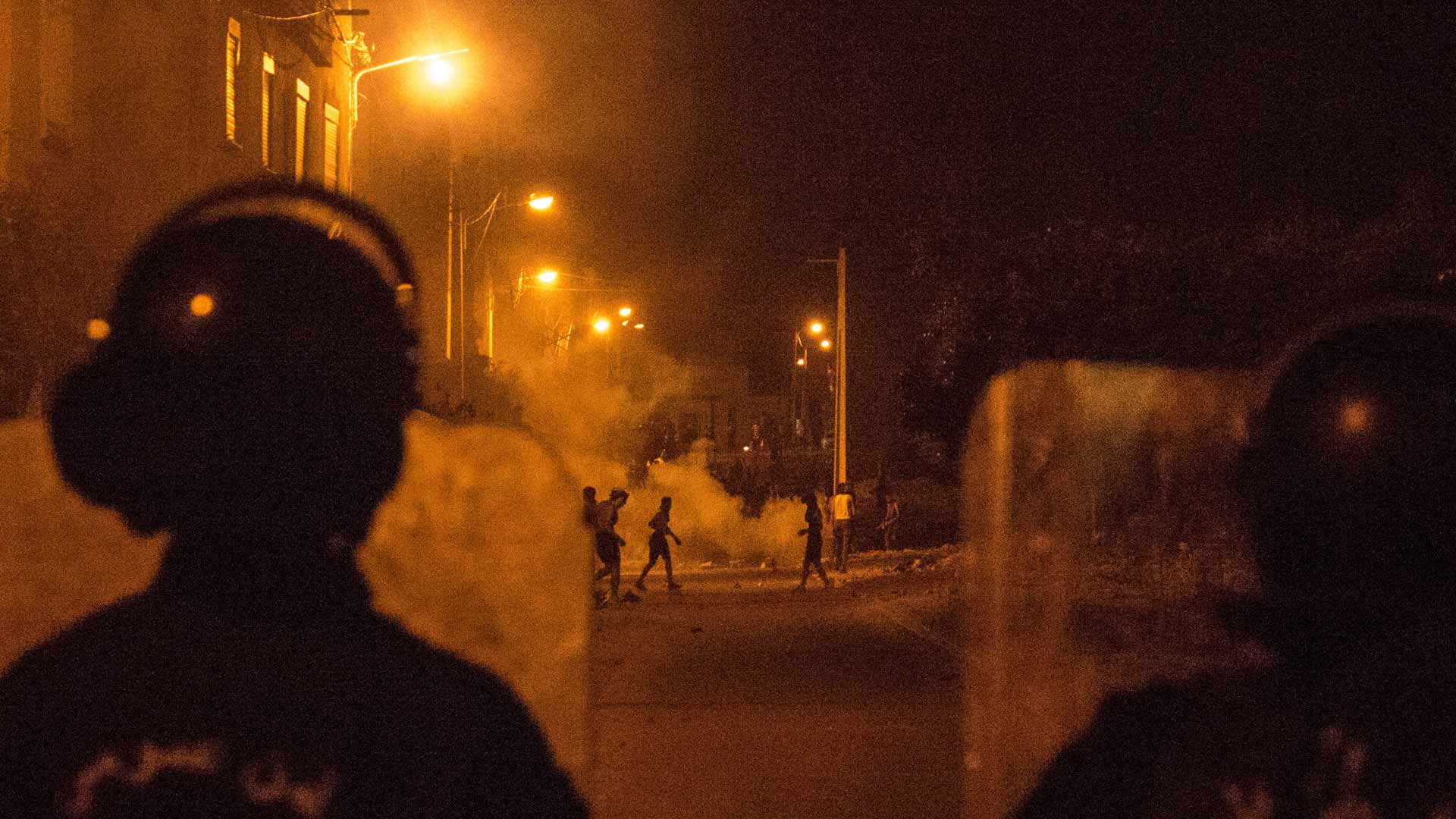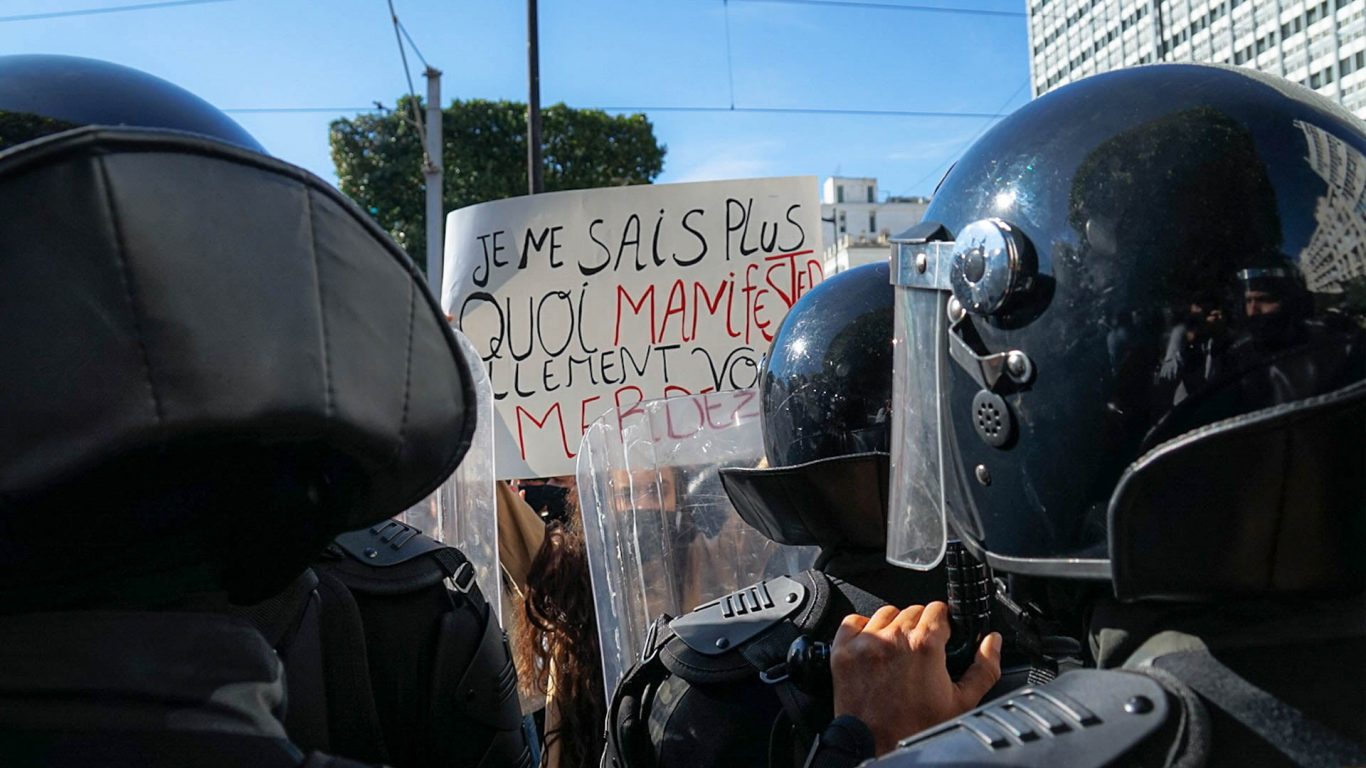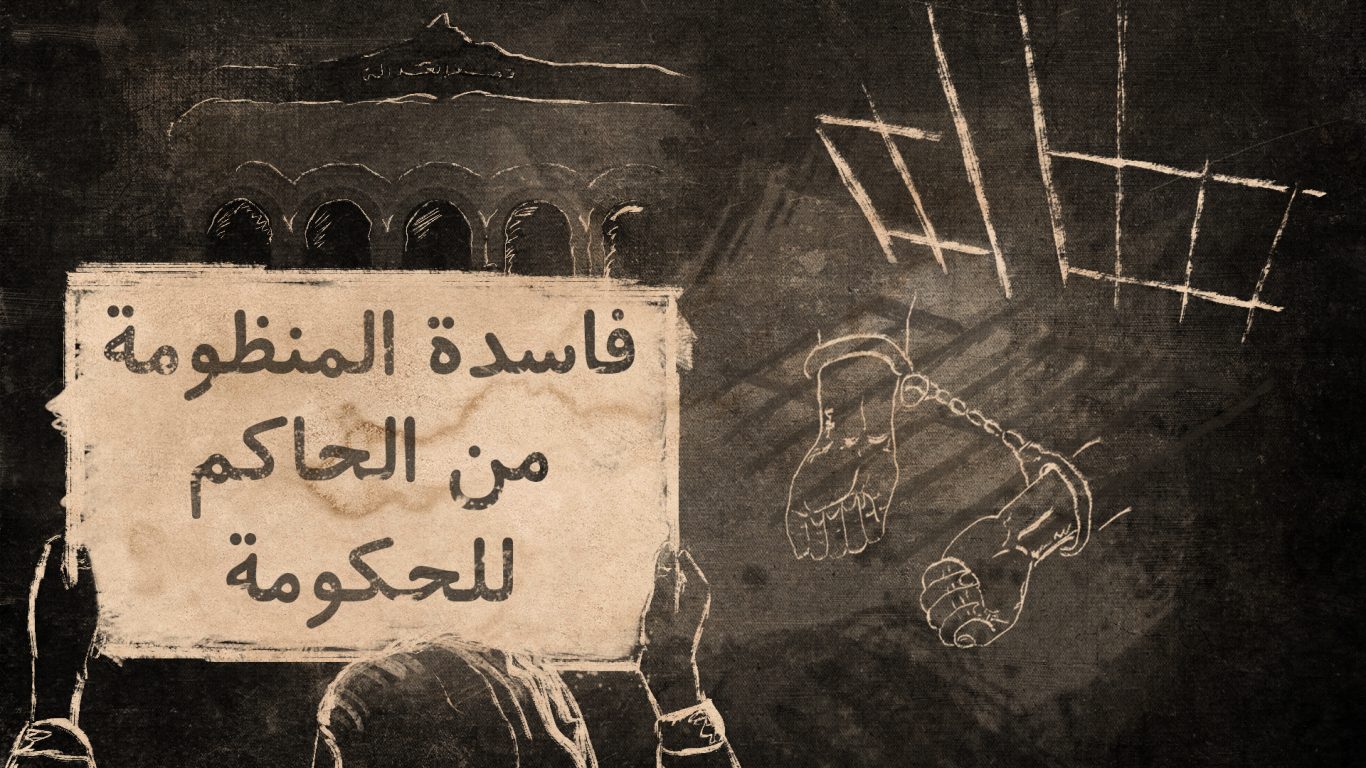It was the fifth consecutive night of protests. The Inkyfada team was on the main road in Sidi Hassine when flames suddenly tore through the darkness of the unlit neighbourhood. Some of the youth had burned tyres and stacked rocks in the middle of the road to obstruct the path of any police cars that might seek to pursue them. Most of the demonstrators took off their shirts and wrapped them around their faces to protect their identities from the inquisitive cameras of the technical police, while also protecting themselves from the tear gas.
Demonstrators hurled all sorts of insults at the police and even named certain security officers, accusing them of passive corruption, failure to enforce the law and illegitimate violence. One of these young people, (who is on the final, official list of those wounded during the Revolution) told Inkyfada: "The police station in Sidi Hassine is more like a 'revenue office'.It is enough to just enter for you will be blackmailed until you give up. Otherwise, you will be subject to multiple accusations and interrogations."
Another young man under twenty continued: "We only know the city centre from photos. When we venture into Habib Bourguiba Avenue, we are confronted by law enforcement. All we have to do is tell them we are from Sidi Hassine and our clothes are checked for drugs. We are presumed to be criminals without any sort of trial. Presumed guilty until proven innocent."
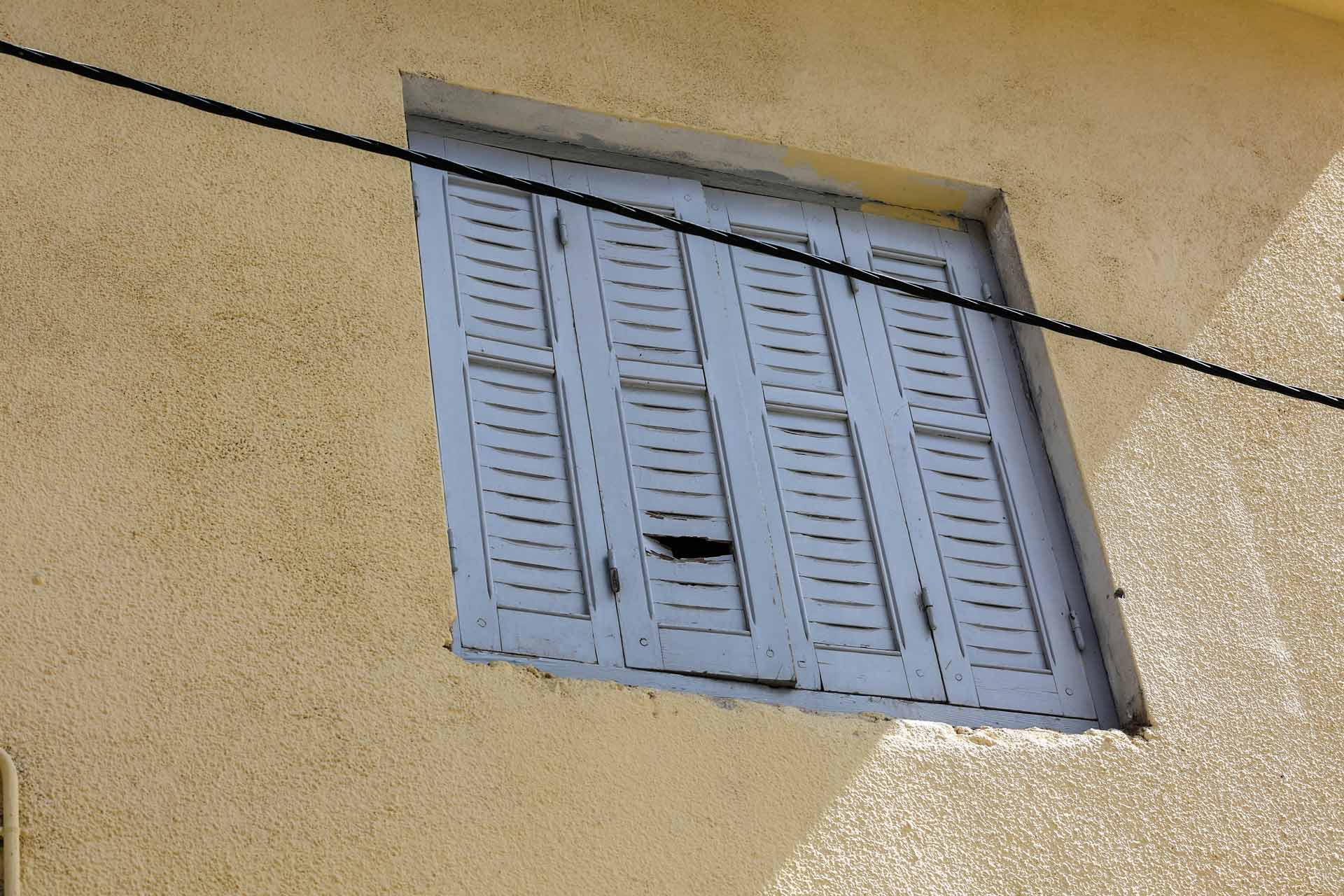
Marks from gas bombs on the window of a house in Cité Mrad in Sidi Hassine.
"Go ahead and drop the gas bomb, but without any insults... This is where the kid was filmed without clothes on, this place is full of cameras", was what one security guard said to his colleague during clashes with the demonstrators. Inkyfada witnessed the police chasing the protesters along the streets of Cité Mrad in Sidi Hassine. The police did not hesitate to throw gas bombs at houses sheltering the protesters, in clear disregard of international standards governing the use of tear gas, which is prohibited to use in enclosed areas.
That evening, the police tried, in vain, to set traps for the protesters in order to arrest them. The wind literally blew in the protesters' favour, as the officers had to stop firing tear gas because the wind was blowing back at them. The opposite was true the night before: the gas went straight towards the protesters.
On the doorstep, a sixty-year-old man was sobbing as he pounded his knees: "I'm tired, my God, I can't take it any more... Every night it's like this, protesters and policemen come to fight in front of my house. I cannot sleep or work anymore. Our house has become a target for gas bombs and the noise at night keeps us awake."
One death, two contradictory versions
On the same subject
It was on the eve of June 10 that the protests erupted as news of Ahmed Ben Amara's death at the Sidi Hassine police station began to spread through the neighbourhood. Although the security officers quickly denied the allegations, Ahmed's family has its own version of the story, with further details on how he was lynched by security officers.
The official version was released the next morning, following pressure from protesters. “The official spokesperson for the Ministry of the Interior, Khaled Hayouni, denied that the young man had died at the police station or at the hands of security officers. According to his statement, Ahmed fled when he noticed that a patrol was chasing him, and was already dead when he arrived at the hospital."
The official spokesperson also blamed the neighbourhood youth who had attacked the security patrol. He claimed that as soon as Ahmed was arrested, his friends started throwing stones at the patrol to try to free him. Inkyfada tried to contact the official spokesperson, Khaled Hayouni, to obtain further details about Ahmed's death and the events in Sidi Hassine, but without success.
Instead, Inkyfada gathered testimonies from Ahmed's family, friends and young people from the neighbourhood. All of them related the same version, as reported by eyewitnesses of the event, they assert. Walid Aouni, Ahmed's friend and neighbour, said: "The day before he died, a security patrol tried to arrest him. As he tried to resist, they confiscated his motorbike, threw it aside and tried to take him to the police van. He refused, saying - according to witnesses - that there was no reason for his arrest and that he was not going to leave his motorbike lying around until it was ruined or stolen."
Walid continued: "As soon as a girl from the neighbourhood shared a video of Ahmed's attack on Facebook, her house was stormed by the police at 2am to delete the video. She was also subjected to threats and naturally got scared, as she is only 17 years old." He then added: "The girl, who witnessed the scene, said he [Ahmed] was molested and taken away in the car."
Inkyfada tried to access the video in question, but it was impossible to find it on Facebook. The media was also unable to contact the girl or even identify her.
Walid questions the situation: "Now you can imagine what happened later. How would he be transferred from the police van to the hospital, handcuffed, by a resident of our neighbourhood? How can we be convinced that Ahmed did not die at the hands of these officers? Can we really believe the version that he was taken from police custody? They were the ones who fabricated this story because he was handcuffed when he arrived at the hospital, so they had no choice but to resort to this deception to exonerate themselves."
Walid says he entered the morgue and saw his friend handcuffed. Looking both pale and flushed with anger, he adds: "I still couldn't accept it. I know Ahmed's kindness and his relationship with his friends. Is it possible that all these people are coming out to demonstrate for a delinquent, as the police would have us believe? In yesterday's demonstrations we witnessed fathers protesting with their children against the security forces. One of our own was hit by a tear gas canister in the chest and, having been unable to go to hospital, is now suffering at home." However, this did not stop the police from arresting him and his brother, who he says was called in for having shared the video of Ahmed's arrest and assault that had been uploaded by the aforementioned girl.
On June 11, one day after Ahmed's funeral, the Inkyfada team travelled to his family home. After taking several turns from the main avenue in the heart of the Sidi Hassine district, Sijoumi, the team finally arrived. The scene was nothing short of a mourning site. People conversing in hushed tones, faces sullen and foreheads sweating in the blazing sun. The most obvious indication, however, was the big white tent, the one that gets drawn up in working-class neighbourhoods for both mournings and celebrations.
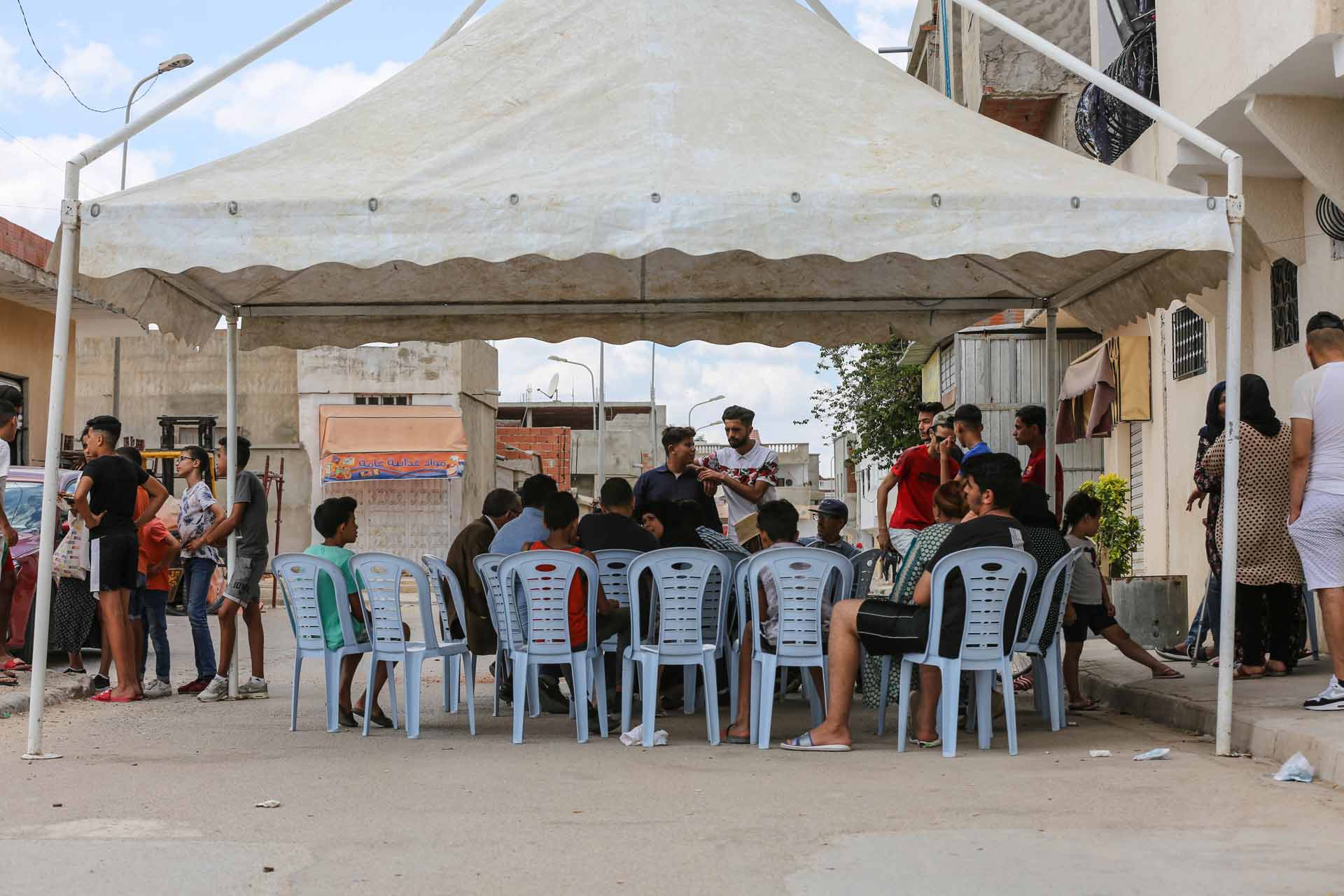
In front of Ahmed Ben Amara's home, one day after his passing.
Sitting on an asphalt step in front of the house, the sixty-year-old Moncef Ben Amara, father of the deceased, rests his head in his hands. He tells Inkyfada: "I hardly sleep. I repeat my son's tragic story to anyone who will listen, dozens of times every day. I am about to repeat it knowing that I will relive for the umpteenth time what I felt, and still feel."
The father goes on to tell us: "Between 6 and 7pm, I passed my son coming out of the house. I told him not to buy bread because I was going to bring some later when leaving the mosque. He nodded and walked away. Little did I know that this would be the last time I would see him alive."
This father's account of the circumstances of his son's arrest was based on eyewitness accounts that Inkyfada was unable to verify. He said: "I was told that the police intercepted Ahmed on the road to Jayara. Even though he was on a motorbike, he could not escape. The police officers caught him and handcuffed him. One of them even called him names."
Ahmed's father continues to relate the events as they unfolded: "When they tried to force him into the car, he tried to resist by blocking the door with his foot. So they started hitting him on the head with a metal object, while his hands were handcuffed. The blows were fatal, and as soon as they realised they had finished him off, they left him lying in the middle of the street and escaped."
With a sinking face, he continues: "He was lying on the ground between passers-by when one of his friends recognised him and took him straight to the local infirmary. The person in charge at the infirmary panicked when he saw that he wasn't breathing, so he asked to transfer him to the hospital emergency room. But by the time they got there, he was already dead."
According to Ahmed's neighbours, the young man who took him to the hospital was arrested the same evening until 4am. Inkyfada wanted to speak to the person in question, but none of the neighbours would cooperate by giving any contact details, claiming that he had told the police the wrong version of events and that he had testified against his friend, for reasons that remain unclear.
The news of Ahmed's death spread through the neighbourhood in record time. Returning from the mosque with the bread, it was not his son who was waiting for the father, but the news of his untimely death. A neighbour said: "When he heard the news, he fell to his knees on the ground, completely shocked. He was still struggling to get over the death of his other son in a traffic accident last year, and here he was losing Ahmed in such an unimaginable way."
The young people who informed Moncef Ben Amara of his son's death brought him to Charles Nicolle hospital. The father told Inkyfada: "They confirmed his death as soon as we entered. Later, the Public Prosecutor came to offer his condolences and announced that an investigation would be opened after the inspection." However, he adds that "the police are now trying to falsely accuse my son of having consumed drugs, whereas he was the object of extreme violence. His skull is smashed. I felt my hand go into his head when I touched him. My son was beaten to death while handcuffed."
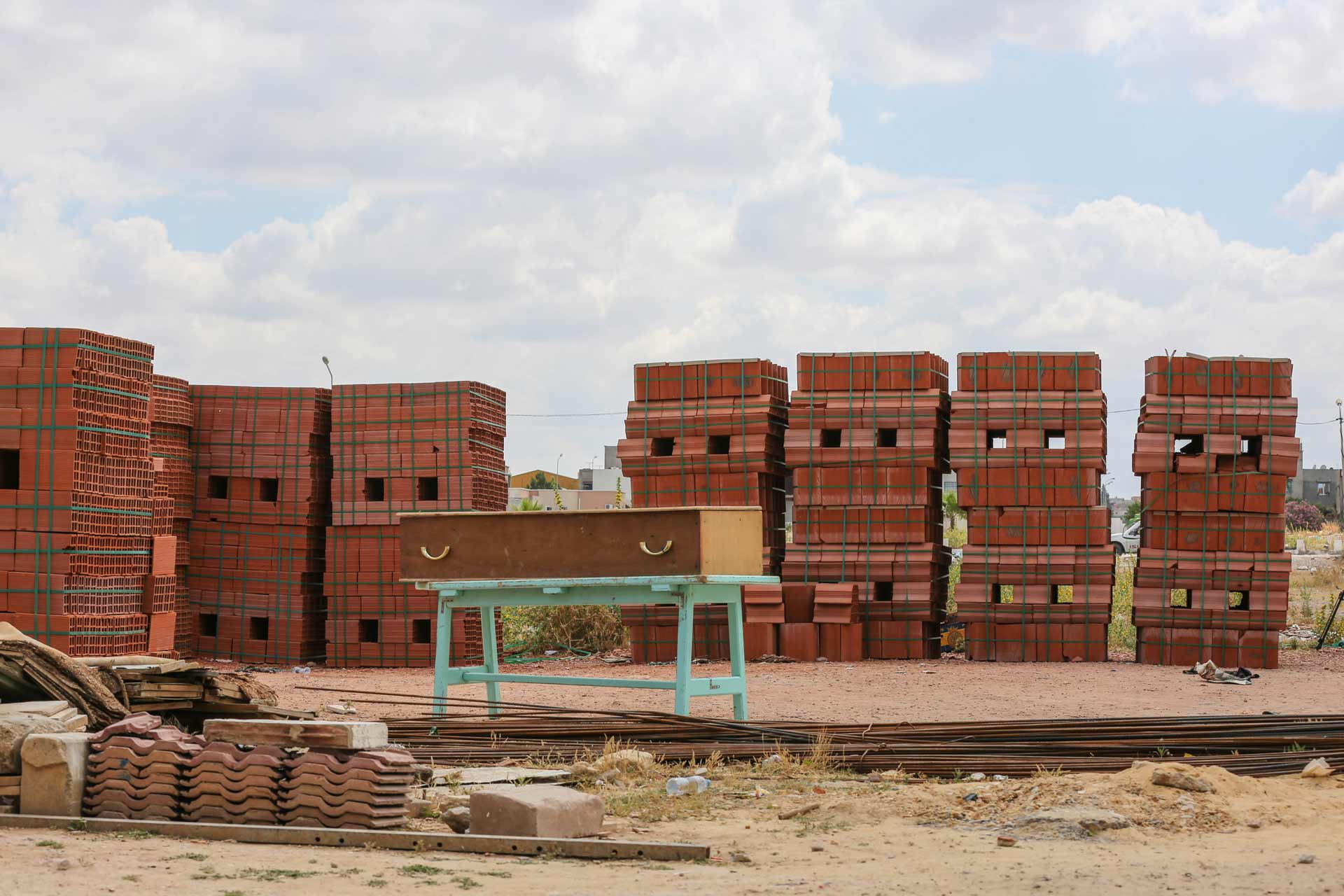
The coffin in which Ahmed Ben Amara was taken to the cemetery, in front of his parents' house in Sidi Hassine.
He continues: "He could not even have a peaceful funeral. Because of the protest movements started by his peers, the police attacked our house with tear gas canisters. The protesters had taken shelter in my house and were chased by the police gas bombs. We have elderly women and children in our house who are at risk of suffocation. Apart from that, we are in mourning, which is supposed to be respected. Why go after us? "
Law enforcement unions on the defensive
Two days after Ahmed's death, the executive board of the union for national security officers announced the mobilisation of 25 lawyers to defend the security officers of the Sidi Hassine district in order to ensure them a fair trial. Theis team of lawyers is led by Bilel Tazni.
On June 13, Bilel Tazni spoke in a televised interview on the Carthage+ channel about the conditions of Ahmed's arrest. He argued that "the patrol was already present at the site of the arrest, given that it is a key location for drug dealers and that Ahmed was suspected of being involved in drug trafficking." Tazni added that "the security officers arrested Ahmed and detained him. But in the meantime, he managed to swallow five capsules of cocaine in order to get rid of it." He then added: "The officers managed to seize a quantity of white and black cocaine that he had in his possession, in addition to five cigarettes, two of which were made out of black cocaine."
In his interview, the lawyer said: "The preliminary autopsy report confirmed that Ahmed Ben Amara died of a drug overdose." He said that, according to the investigation reports consulted, the security agents left Ahmed handcuffed, while he was transferred by a group of youths to the infirmary without handcuffs, fifteen minutes later. However, he stresses that the body did not show any traces of violence. In support of this, he said that it was the "preliminary autopsy report" had ruled that the death was caused by swallowed substances and not by aggression. He also referred to the results of the investigation carried out by the public prosecutor's office, which did not reveal any traces of violence.
For its part, the Public Prosecutor's Office told the Acharaa Al Magharibi site, via Fathi Smati, the official spokesman for the Tunis 2 Court of First Instance, that "according to the preliminary examination, Ahmed's remains did not show any traces of extreme violence, and that the deceased is suspected of having consumed narcotics in order to erase the evidence of his own detriment."
According to Fathi Smati's statement, "only the forensic doctor's report will determine the reasons for the death, and it is only in the light of its conclusions that those responsible will answer for their actions, if there is any liability".
On the other hand, Inkyfada spoke to Toumi Ben Farhat, one of the lawyers in charge of Ahmed Ben Amara's case. Mr. Ben Farhat said that "after contacting the Public Prosecutor's Office, the latter assured, in turn, that it had not received any preliminary autopsy report. To put it in the words of the lawyer of the security unit: neither the case files, nor the Ben Arous research brigade or the Public Prosecutor's Office itself, had any such reports at their disposal."
According to Ben Farhat, "evoking such a report without proof of its existence comes under one of the two following hypotheses: either the security unit involved would have obtained the documents before all the other parties, i.e. the public prosecutor's office and the research brigade, which would qualify as document theft; or it is the lawyer of the security unit who would have attempted to spread rumours." In both cases, what happened was illegal, according to the lawyer.
Ben Farhat also assured that they - that is, Ahmed's lawyers - are in the process of listening to the witnesses who are now under unbearable pressure. They may file a complaint based on the words of the lawyer of the security unit.
When funerals and battles intertwine
The Ministry of the Interior seems to be wavering in its position regarding the events in Sidi Hassine. It seems to be evading responsibility and continuing to muddy the waters. On the one hand, the Ministry persists in disseminating only one version of the death of Ahmed Ben Amara, in the absence of photo or video documentation. It is, moreover, a typical case of glorifying the efforts of the police while ignoring certain details of the event, such as the fact that the patrol that arrested Ahmed left him lying on the ground, handcuffed. On the other hand, following the infamous incident of June 10 where security agents undressed and then lynched a 15-year-old child, the Ministry rushed to publish a second statement the next day about the event that had been documented by a video that went viral.
In its first statement, the Ministry of the Interior had indicated that the person in the video was "in an advanced stage of inebriation, and as soon as the patrol tried to question him, he deliberately undressed on the public highway to provoke the security officers."
He added that “after consultation with the Public Prosecutor's Office, the latter has authorised the detention of this person for public indecency and violating good morals, in order to take necessary legal action against him”. In the same statement, he said that "an investigation has just been opened at the National Security General Inspectorate within the Ministry of the Interior to determine the responsibilities in the intervention of law enforcement agencies to control the individual in question and the ensuing breaches, as well as taking the necessary steps in light of the results of the investigation”.
Public pressure and social media exposure of several videos from the same incident, in which security officers strip a child under the age of 15 naked, prompted the Ministry to remedy the situation. It therefore issued a second statement which read: "Due to the dissemination of a video clip on social networks showing the assault of a citizen by security forces, the Ministry of the Interior condemns these practices and states that they go against their general tendencies."
In their statement, the Ministry also announced "the suspension of the officers responsible for these violations". In conclusion, the Ministry stated that it would continue to improve the performance of its officials and strengthen their training so that they can carry out their duties in accordance with the requirements of republican security and citizen services.
Inkyfada also spoke to eyewitnesses to a child being stripped naked and molested during the funeral of Ahmed Ben Amara, an incident that marked a new stage in the evolution of clashes between the neighbourhood youth and the police. Omar*, a 17-year-old resident of Cité Mrad in Sidi Hassine, told Inkyfada: "I was at the funeral. We had not yet arrived at the cemetery when 3 police cars started to chase us in order to scatter the crowd, and it did not take long for the tear gas canisters to start flying. The young man (the one who was later filmed, stripped naked and lynched by the police) had fled because he couldn't bear the smell of the gas and was on the verge of asphyxiation."
Omar adds: "The first time they came to arrest the child, one of the officers said to another: 'Hey, put him in the salad basket [i.e. the police van].' But the other said, 'No, wait, I've got some business to settle with him first.' And that's when he pushed him to the ground and stripped him of his clothes, before beating him with a baton." (According to Omar*)
Omar exclaims in a bitter, plaintive voice: "Why are the police treating us this way? He is only [15] years old, what will happen when he grows up? How will he look at the police? The child’s psychological state worsened, and he is no longer able to meet anyone."
The young man continues just as gloomily: "The police only see us as a potential source of money - that is, an opportunity to be bribed - or as criminals. In 2017, police officers killed Aymen Othmani with a bullet, saying that it hit him by a ricochet. They told Omar Labidi to 'learn to swim' and left him to drown. Now Ahmed was beaten to death without having done anything. Next time it will be one of us."
Omar, increasingly distraught, continues: "You've made our lives hell... at just 16 years old, all we can think about is leaving Tunisia. Worst case scenario, we die in the middle of the sea or the police give us a fake trial. Even death did not prevent them from slandering Ahmed and making false accusations. We started the revolution for freedom, and all we got was oppression and violence. How can the police tear gas a funeral? How can you expect us not to react?"
Omar's frustration turns to anger, and he gets up from his plastic chair and exclaims, "Where is the Constitution that they have spent millions on? They talk about drugs when the police themselves are involved in drug trafficking and marketing. We could very well point the finger at them. Ahmed didn't die of an overdose, he was murdered. You - yes, you - the police-beat him to death. Why did you dump him in handcuffs in the middle of the street? Why didn't you rescue him? Those officers left him in the street for fear of being implicated in his death."
According to various testimonies relayed to Inkyfada, this is not the first time that security officers have been accused of being involved in drug trafficking or other illegal activities, especially in working-class neighbourhoods. The Ministry of the Interior, however, remains unfazed by such accusations.
Walid intervened to support Omar's words*: "We are fighting against the head of the government who is the Ministry of the Interior himself. This means that every time an incident occurs now, he will try to cover it up by any means. There are no honest people in the top positions in this country."
He continues: "The security officers treat us like vermin. In what capacity are they judging us without being judges? We are guilty until proven innocent. Let's even suppose that Ahmed was a delinquent, which is far from true, - why didn't you take him to the hospital after beating him? Why did you leave him lying on the ground like a dog? At least hand him over to the justice system, and he will get what he deserves."
On the same subject
"I myself spent nine months in prison and was released after the case was dismissed", says Walid. "I went to file a complaint, but they laughed at me and told me that I would never win my case, and that I was not in Europe [where I could] talk about reclaiming my rights and erasing my criminal record."
Walid is a frail young man with a leg injury who walks with a crutch. At 32 years old, he is still unemployed; just like his 45-year-old brother. According to him, young people like him are hanging around the streets because of blocked opportunities and empty political promises.
On the evening of Ahmed's funeral, several mothers went to the police station in Sidi Hassine. One of Ahmed's neighbours, who was there, told Inkyfada: "The chief of the police station is a real gang leader, a gang whose members are corrupt, are involved with drugs and do not seek to impose any form of order or respect in the neighbourhood." She added: "I confronted the chief of the police station on the night when the protests started. I was talking to him and recording it on my phone. I'm not afraid of speaking, they can't do anything to me."
"Since Ahmed's death, we have been inhaling tear gas every night, whether we are small or big, sick or healthy. They throw the gas bombs at the houses themselves. What can we do then? Should we step out and get killed so they can get peace?"
The Inkyfada team went to meet some of the residents at the heart of Cité Mrad in the district of Sidi Hassine, the epicentre of the police clashes. Among them, Fares, a young man in his thirties, recounts the second evening of the clashes: "We were sitting there, in front of our houses, when there was a clash with the police near the premises of the Revenue Office, after which the young people involved sought refuge here. The officers stormed the neighbourhood in pursuit of them and started throwing stones when they ran out of tear gas canisters. Abdallah, our neighbour, had just returned from the mosque when an officer hit him with a stone. As if that wasn't enough, another officer kicked him twice in the face when he fell to the ground, making him bleed."
One of Abdallah's neighbours informed us that he is an orphan with only one sister, and that he is a naturally calm and peaceful person. Inkyfada called Abdallah's sister, who confirmed that her brother was now indeed suffering from a haemorrhage, a head injury and arterial thrombosis. He has just been admitted to intensive care.
At the entrance to Ahmed Ben Amara's house, his aunt greets the people who have come to offer their condolences. She never misses an opportunity to express herself to the media. In a trembling, barely intelligible voice, she tells Inkyfada: "Wasn't Ahmed a human being? We want justice for my nephew, we want his killers to be imprisoned. Why inflict such pain on us? The news of his death shocked us. We want justice for him, we want all those in charge to look into his case. My brother is a mere shadow of his former self and my niece's condition is rapidly deteriorating."
Ahmed's mother-in-law can hardly contain her tears as she recalls the details of the last day of his life. She says she is fed up with police behaviour following the death of her son-in-law. She adds that after enduring the tear gas and insults hurled at her house all evening by the police in pursuit of the protesters, she had exhausted the last of her energy.
When asked what his plan is after finishing school, Omar* replies: "I'm trying to save up for the cost of irregular immigration, that's what we all do here. In Europe, you only need to be equal to a dog to be protected in the eyes of the law and society." In the collective imagination of the youth in his neighbourhood, Ahmed's tragedy is just another reminder that they are oppressed, marginalised and have no choice but to take to the streets to reclaim their rights.
